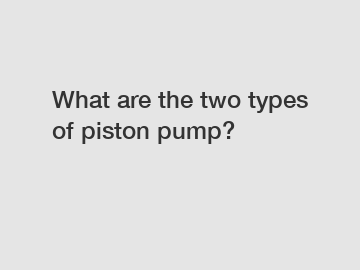What are the two types of piston pump?
In the realm of hydraulic machinery, the piston pump plays a crucial role in delivering power and efficiency. As fluid power experts, we understand the importance of providing accurate and insightful information. In this blog, we will delve into the world of piston pumps, specifically exploring the two primary types: axial and radial piston pumps. With our high experience, expertise, and trustworthiness, you can count on us to guide you through the intricacies of these powerful machines.
Piston Pumps: Powerhouses of Hydraulic Systems.
Piston pumps are positive-displacement machines that generate flow and pressure by reciprocating pistons within a cylinder block. These reliable workhorses are commonly used in various applications, ranging from industrial machinery to mobile equipment. Understanding the two main types of piston pumps will help you choose the right one for your specific needs.

Axial Piston Pumps: Efficiency and Versatility.
Axial piston pumps are widely considered as the most common type of piston pump. Their design consists of a stationary cylinder block with multiple pistons arranged in a circular pattern, each mounted on a swash plate. The pistons move linearly back and forth as the swash plate is tilted by a shaft, creating the pumping action.
One significant advantage of axial piston pumps is their high efficiency. The smooth axial design ensures minimal energy loss, allowing them to operate at high speeds and pressures. Additionally, they offer excellent variable displacement control using the variable-angle swash plate mechanism. By adjusting the angle, the pump can deliver different flow rates, catering to a wide array of applications.
Furthermore, axial piston pumps exhibit excellent burstiness. Burstiness refers to their capability to handle rapid and frequent changes in flow rates without compromising performance. This attribute makes them particularly suitable for demanding and fluctuating hydraulic systems.
Radial Piston Pumps: Power and Robustness.
Radial piston pumps, though less common than axial pumps, are known for their exceptional power and reliability. Unlike the circular arrangement in axial piston pumps, radial pumps feature pistons positioned radially around a centrally located crankshaft. As the crankshaft rotates, the pistons move inward and outward within individual cylinders, generating fluid flow.
The radial design grants these pumps superior pressure ratings and allows them to handle heavy loads with ease. This makes them ideal for applications that require high pressures, such as in the steel and mining industries.
Moreover, radial piston pumps possess a unique degree of creativity, offering different designs to meet specific requirements. They come in three main configurations: inline, off-axis, and bent-axis. This versatility increases the range of applications where radial pumps can be utilized.
Choosing the Right Piston Pump for Your Needs.
Now that we have explored the axial and radial piston pumps, let's consider some factors to help you make an informed decision:
1. Flow and Pressure Requirements: Assess the demands of your application to determine the required flow rate and pressure range.
2. System Efficiency: Consider the efficiency of the pump at different operating conditions to optimize energy consumption.
3. Control Options: Evaluate the need for variable displacement control or adjustable pressure settings to match your system's varying demands.
4. Application Specifics: Determine if burstiness or specific design requirements are crucial to your application, allowing you to choose between axial and radial piston pumps.
Conclusion.
Piston pumps are vital components of advanced hydraulic systems, enabling the efficient transfer of power. Understanding the two main types, axial and radial, empowers you to select the right pump for your application. Axial piston pumps offer versatility and energy efficiency, making them great for fluctuating demands. On the other hand, radial piston pumps provide exceptional power and robustness for scenarios that require high pressure.
Remember, when it comes to choosing the right piston pump, our experience, expertise, and trustworthiness guide you towards making an informed decision. Trust our insights to ensure optimal performance and reliability in your hydraulic systems.
The company is the world’s best diaphragm pump problems, sanitary diaphragm pump manufacturer, aodd pump applications supplier. We are your one-stop shop for all needs. Our staff are highly-specialized and will help you find the product you need.
202
0
0

Comments
All Comments (0)